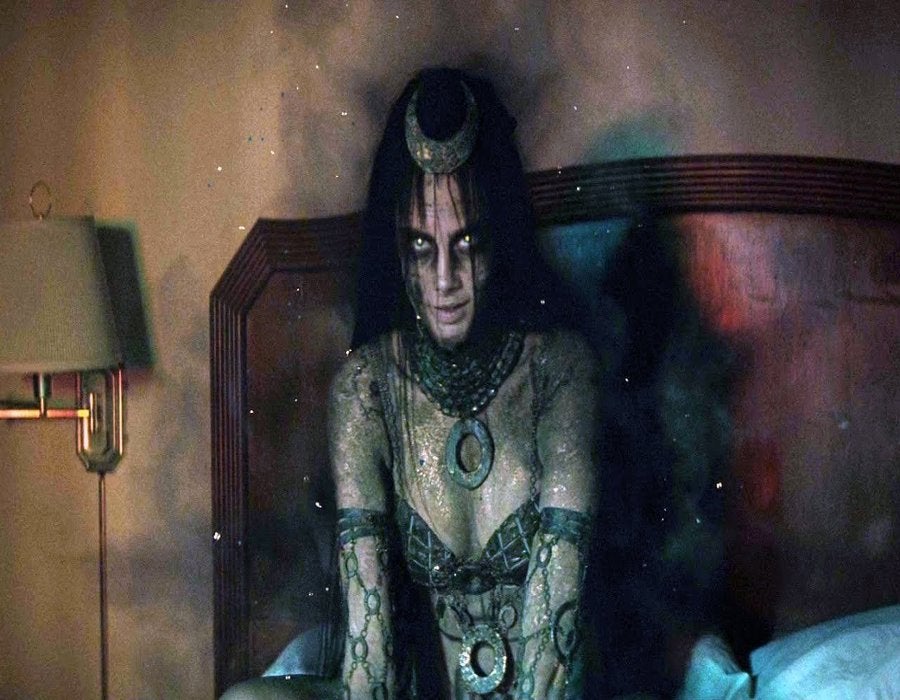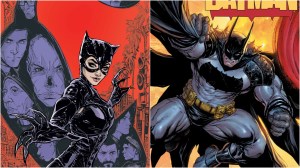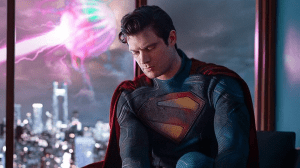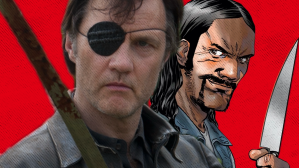Comic book movies can be described as the good, the bad, and the ugly — and the same is true of their big bads. The villain of a comic book movie has a great responsibility: whether or not they’re a sympathetic figure, our leading man or lady has to look heroic going up against them, and the baddie has to pose an immediate threat that the hero has to overcome while saving the day. The villain in a comic book movie more often than not is the driving force of the whole narrative, so if your antagonist is ineffectual, it’s hard for the movie to work properly.
Videos by ComicBook.com
As succinctly said by legendary film critic Roger Ebert, “Each film is only as good as its villain. Since the heroes and the gimmicks tend to repeat from film to film, only a great villain can transform a good try into a triumph.”
Look at Spider-Man 2, The Dark Knight, or Iron Man: all considered some of the best of the genre, and all featuring foils who really put our hero through the ringer. On the other hand, when naming some of the weaker efforts from the genre, almost all of them have a weak villain as just one part of their myriad of problems.
How many bad superhero movies can you name that had a worthwhile villain? Probably not many. But you can point to villains who were either bad (and not the good kind of bad) or downright embarrassing. Here are the worst.
Batflix and Chill
This is an easy one, so we’ll get it out of the way: the trio of dumbed-down villains in the live-action cartoon Batman & Robin are not only poor adaptations of three strong comic book characters, they’re farcical in nature.
Mr. Freeze (Arnold Schwarzenegger) isn’t a bad villain because he constantly spouts ice and cold puns, he’s a bad villain because his internal pathos is ignored in favor of playing up the hammier side of an otherwise tragic figure.
The movie explains Dr. Victor Fries’ sympathetic backstory — he was developing a cure for a disease that left his beloved wife terminally ill, only to fall victim to a lab accident that left him in need of a cryogenic suit to survive — but any drama is undercut by Batman & Robin playing like a spoof of the Adam West Batman show. Freeze helps save the life of Batman’s (George Clooney) beloved butler, Alfred (Michael Gough), who had fallen desperately ill from the same disease that affected Freeze’s wife — but because the villain spent the last two hours chewing the scenery and gleefully robbing Gotham City of its diamonds, his redemption is rendered inert and hollow.
Worse still is Bane (Robert Swenson), a master manipulator and genius who is reduced to a mindless, wordless brute with less depth than a Power Rangers Putty Patroller. Bane of the comics is a powerhouse in more ways than one, and reducing him to witless muscle makes you wonder why he was included at all — other than to capitalize on the popularity of a fresh character who, at the time, had become a hit character in the comics after “breaking” the bat.
Finally, there’s Poison Ivy (Uma Thurman), a villain as single-minded (and just as threatening) as Mr. Freeze. Outside of making un-nature-ly bad puns (like that one), the seductress does little more than manipulate Mr. Freeze in the means of achieving her goal of botanical domination. Or something.
Being the villains of a feature length toy commercial doesn’t excuse you from being about as threatening as Colonel Gumm. (POW!!)

Space Junk
In Green Lantern, the emerald space cop has to contend with Parallax (voice of Clancy Brown), a space-poop-looking entity that feeds on the yellow power of fear, which is also the weakness of the Green Lanterns and the antithesis of will, represented by green power. Parallax’s first cinematic appearance was Green Lantern. It was also his last.
Parallax was beaten to the screen by “Galactus,” a cosmic space cloud that kind of sort of resembled the Stan Lee and Jack Kirby creation when it appeared for two microseconds in Fantastic Four: Rise of the Silver Surfer. Hurricane Andrew — sorry, Galactus — intended to feast on the Earth, rendering it a lifeless, worthless husk, not unlike the status of the Fantastic Four as a cinematic property.
Though both of these planet-killers failed at their goals, they did effectively snuff out a pair of franchises. Take that, heroes!

Dis4ster
Speaking of dead franchises, another cinematically botched Victor Domashev Victor von Doom (Toby Kebbell) menaced the Fantastic Four in Fant4stic, the most misguided, dark and edgy reboot since You’re a Rat Bastard, Charlie Brown. Doom, who actually spends almost all of the movie on good terms with mortal enemy Reed Richards (Miles Teller), is accidentally left behind on Planet Garbage, where he is endowed with the ability to commit Scanners-esque head explosions on his enemies, except for the Fantastic Four, whose heads he doesn’t pop like pimples even though he totally could but doesn’t for some reason.
Returned to Earth looking like a particularly upset looking crash test dummy, Doom wishes to return to Planet Zero, destroy the human race, and rebuild Earth in his image. Doom’s awful appearance could have been overlooked if his character had been nailed, or at least fairly adapted, but instead of the iron-fisted dictatorial leader, instead of the regal, prideful, vengeful Victor von Doom, audiences were saddled with a shut-in who had to be coaxed away from his video games.
Doctor Doom, the greatest of all Marvel Comics villains, has been botched in all three of his big screen outings. There’s something to say about the 1994 Roger Corman Fantastic Four being the best and most accurate take on the character so far, considering that movie was made with the same budget of an elementary school play and Doom looked like an oversized Mego figure.

Lex Loser
Alexander Luthor Jr. (Jesse Eisenberg) isn’t the “real” Lex Luthor — that would be his father, already dead by time of Batman v. Superman: Dawn of Justice — but he has a grudge against Superman (Henry Cavill), he’s rich, he’s from Metropolis, he’s smart, he goes bald, and no one likes him, so yeah, he is Lex Luthor.
For whatever reason, Luthor here is depicted as being a kind of boy wonder science and tech guru, whose LexCorp Industries is up to all kind of no good. Instead of having any kind of worthwhile bone to pick with Superman, this Lex has some weird fixation-slash-projection going on: he blabbers on about gods and demons and stutters and stammers his way in between Jolly Rancher sucking sessions. Okay, so he’s not the suave, collected, business tycoon that Luthor tends to be in modern comics — cool, he’s no Denzel, fine. But why is Lex Luthor such a spaz?
If this Luthor were given some actual, tangible motivation, he would have been a more effective villain. Is Lex used to being the center of attention, and used to being propped up as Metropolis’ golden boy, and becomes petty and jealous over Superman usurping his role as the city’s savior? That would be a good reason for wanting to publicly tear Superman down, right? Well, no — not too many people care about this Superman.
Maybe the young Lex grew up feeling neglected and unwanted by his business-oriented father, who cared for nothing more than his company, right, and Lex junior — entrusted with LexCorp after the elder Luthor became too sick to carry on the daily operations — really strived to expand LexCorp into the biggest tech giant in the world, his sole goal being to earn the admiration and love of his otherwise distant father. And then Superman, that dirty, inhuman alien, comes to Earth and LexCorp’s Metropolis headquarters is destroyed in the battle — maybe dear ol’ dad is a casualty of the Kryptonians fight, too. That would give Lex a real grudge against the Man of Steel, right?
Instead, Lex has a hangup on religion that isn’t fully defined outside of his dad was apparently a big a-hole. That’s awful, and does render him sympathetic, but his vendetta with Superman didn’t feel personal when it really should have. If you’re going to go so far to acquire a dead Kryptonian and turn his body into a hulking rage creature and sic it on Superman, you should have better reasons. Maybe Lex was too busy taking graphic design courses and coming up with monikers and logos for the Justice League (who weren’t yet a thing) to come up with an easily defined reason for his actions.

Moone-ing the Audience
In Suicide Squad, archaeologist June Moone (Cara Delevingne) is possessed by an ancient witch, and the spirit’s disembodied heart is the only thing capable of controlling the powerful, godlike spirit. So, naturally, the heart is more easily accessed and captured than a Pidgey in Pokemon Go. The being, known as Enchantress, is kept in check by Amanda Waller (Viola Davis) — who’s such a fantastic villain her name shouldn’t even be mentioned in this list — but eventually manages to reunite with her brother, Incubus (Alain Chanoine), an ancient being just thankful for the work since serving as understudy on The Mummy spinoff The Scorpion King.
Tasked with bringing down this mega-powerful witch capable of destroying an entire city is Batman the Flash the newly assembled Task Force X, aka the “Suicide Squad,” which consists of a guy with impeccable aim and a clown with a baseball bat. Enchantress, whose motivation is as vague and as original as wanting to take over the world, speaks some mumbo jumbo and gyrates like a solar-powered hula dancer toy spotted on vehicle dashboards.
Enchantress isn’t an antagonist so much as she is a plot device — a thing for the Suicide Squad to fight. She doesn’t really do anything, besides create some generic, CGI minions, and erect some generic, CGI portal, the same one that was played out in The Avengers and every other Transformers and The Amazing Spider-Man and a Teenage Mutant Ninja Turtles movie and Fant4stic and…
Suicide Squad would have been better off keeping things small scale — maybe send the crew on some officially unofficially sanctioned mission that the government could never publicly acknowledge — but instead, the movie descends into a CGI-fest that has characters like Harley Quinn (Margot Robbie) and Deadshot (Will Smith) going up against an ancient, magical witch. Enchantress is such a non-entity that she’s more comparable to Galactus or Parallax — or, heck, even Doomsday — than she is an actual character.
It’s a shame that a movie that was all about the villains had a villain that was so forgettable and boring. [Gyrates angrily.]






